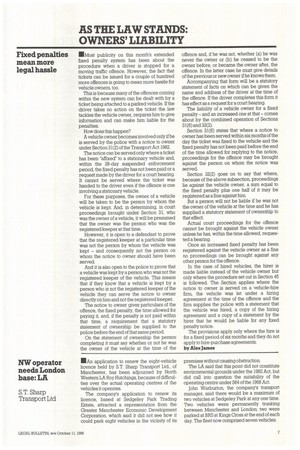Fixed penalties mean more legal hassle
Page 63

If you've noticed an error in this article please click here to report it so we can fix it.
111Most publicity on this month's extended fixed penalty system has been about the procedure when a driver is stopped for a moving traffic offence. However, the fact that tickets can be issued for a couple of hundred more offences is going to mean more hassle for vehicle owners, too.
This is because many of the offences coming within the new system can be dealt with by a ticket being attached to a parked vehicle. If the driver takes no action on the ticket the law tackles the vehicle owner, requires him to give information and can make him liable for the penalties.
How does this happen?
A vehicle owner becomes involved only if he is served by the police with a notice to owner under Section 31(2) of the Transport Act 1982.
The notice can be served only where a ticket has been "affixed" to a stationary vehicle and, within the 28-day suspended enforcement period, the fixed penalty has not been paid or a request made by the driver for a court hearing. It cannot be served where the ticket was handed to the driver even if the offence is one involving a stationary vehicle.
For these purposes, the owner of a vehicle will be taken to be the person by whom the vehicle is kept. And, in determining, in court proceedings brought under Section 31, who was the owner of a vehicle, it will be presumed that the owner was the person who was the registered keeper at that time.
However, it is open to a defendant to prove that the registered keeper at a particular time was not the person by whom the vehicle was kept and consequently not the person on whom the notice to owner should have been served.
And it is also open to the police to prove that a vehicle was kept by a person who was not the registered keeper of the vehicle. This means that if they know that a vehicle is kept by a person who is not the registered keeper of the vehicle they can serve the notice to owner directly on him and not the registered keeper.
The notice to owner gives particulars of the offence, the fixed penalty, the time allowed for paying it, and, if the penalty is not paid within that time, a requirement that a statutory statement of ownership be supplied to the police before the end of that same period.
On the statement of ownership the person completing it must say whether or not he was the owner of the vehicle at the time of the offence and, if he was not, whether (a) he was never the owner or (b) he ceased to be the owner before, or became the owner after, the offence. In the latter case he must give details of the previous or new owner if he knows them.
Accompanying that form will be a statutory statement of facts on which can be given the name and address of the driver at the time of the offence. If the driver completes this form it has effect as a request for a court hearing.
The liability of a vehicle owner for a fixed penalty and an increased one at that comes about by the combined operation of Sections 31(6) and 32(2).
Section 31(6) states that where a notice to owner has been served within six months of the day the ticket was fixed to the vehicle and the fixed penalty has not been paid before the end of the time allowed for replying to the notice, proceedings for the offence may be brought against the person on whom the notice was served.
Section 32(2) goes on to say that where, because of the above subsection, proceedings lie against the vehicle owner, a sum equal to the fixed penalty plus one half of it may be registered as a fine against him.
But a person will not be liable if he was not the owner of the vehicle at the time and he has supplied a statutory statement of ownership to that effect.
Actual court proceedings for the offence cannot be brought against the vehicle owner unless he has, within the time allowed, requested a hearing.
Once an increased fixed penalty has been registered against the vehicle owner as a fine no proceedings can be brought against any other person for the offence.
In the case of hired vehicles, the hirer is made liable instead of the vehicle owner but only where the procedure set out in Section 45 is followed. The Section applies where the notice to owner is served on a vehicle-hire firm, the vehicle was let under a hiring agreement at the time of the offence and the firm supplies the police with a statement that the vehicle was hired, a copy of the hiring agreement and a copy of a statement by the hirer that he would be liable for any fixed penalty notice.
The provisions apply only where the hire is for a fixed period of six months and they do not apply to hire-purchase agreements.
by Alex James
























































































































